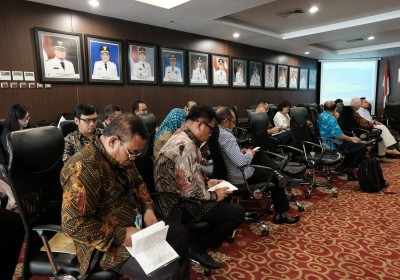Green Development To Overcome Gaps
May 14, 2018
Stakeholders attended Lestari District Community Meeting to discuss sustainable development, on Tuesday, April 8, 2018.
The people of Sigi Regency, Central Sulawesi, are currently highly motivated to manage their forests and lands. Such spirit was motivated by the decision of the Regent of Sigi, Mohamad Irwan Lapatta, who included Agrarian Reform into their district Medium-Term Development Plan to boost community participation in conducting participatory land mapping. As many as 125 out of a total of 176 villages in Sigi worked hand in hand to meet requirements for Land Objects of Agrarian Reform as well as social forestry consisting of village forests, community forests, community plantations, community forests, customary forests, and forest partnerships.
Sigi area is obviously distinguished from other districts. If other districts are filled with settlements, Dwi Darma Yudha, the head of Sigi’s Disctrict Office or Environment Protection and Management mentioned that almost 75 percent of the district is forest area. This forest area consists of various functions such as conservation areas, protected lakes, protected forests, limited industrial zones, as well as production forests. In fact, this area produces watersheds that provides water for other districts in Central Sulawesi including Palu.
"Even 25-26 percent of forest area is used by the community," said Dwi when speaking at the the forum which adopted the theme “Free from Disparity.”: Sustainable Governance-Based Governance Innovation for Sustainable Lands ", Tuesday, May 8, 2018.
Dwi said forest and mountaneous areas are what make Sigi determined to use the Green Sigi and Sigi Magasena Programs to address problem of poverty and inequality. The goal is sustainable developmentt that is based on sustainable utilization of natural resources and empowerment of the communities living in the forest areas.
Sustainable development is indeed a solution for the regions that want to overcome the disparities without causing disasters. Planning Staff of the Directorate of Regional Autonomy at the Ministry of Development Planning, Taufik Hidayat Putra, said that sustainable development requires collective work involving all level of governments including he national and sub national levels.
"Therefore, the local government is expected to participate by developing their regional action plan and then integrating it into the RPJMD so that the costs can be allocated in the regional budget (APBD)," said Taufik.
The ongoing development discussed at this meeting was one of the series of discussion that will lead to Indonesia Development Forum 2018 which was initiated by Bappenas and supported by the Australian Government through the Knowledge Sector Initiative. The July 10-11 forum aims to explore opportunities and challenges in sustainable development-based governance.
The Associate Researcher of the Fiscal Policy Office, Ministry of Finance, Joko Tri Haryanto, said the success of sustainable development depends on three aspects. They are the political commitment of the bupati or head of the region, the presense of capable bureaucracy, and the participation of civil society involved in the development process.
"But keep in mind, every district has different challengez," said Joko.
He suggested that local governments set up priorities when developing sustainable development plans. Multistakeholder work is so important, thereby makin gprivate sector involvement cruciat to the successful implementation of sustainable green development.
Gorontalo Regent Nelson Pomalingo added that this sustainable development could overcome regional disparities. According to him, implementing sustainable development will require regions to continue to promote and carry out environmental conservation while strengthening local economy and addressing poverty. Sustainable development will be tailored according to local wisdom so that community will establish a sense of ownership.
"If all regions implement this, problems of inequality may be significantly addressed.” This is because the currenly existing problems are those related with the inter-individuat, as well as inter-regional gaps,"said Nelson, former rector of Muhammadiyah University of Gorontalo.
Indonesia’s Research Institutions Supporting the Development of the Electric Vehicle Industry
Indonesian Muslim Fashion and Cosmetics IKMs Shine at Dubai World Expo 2020
Govt Steps Up UMKM Transformation Efforts in the Midst of Pandemic Slowdown
Govt Encourages Promotion of IKM Products in Digital Era
Government Begins Developing Maritime Training Center in Makassar
Tweets by IDDevForum
